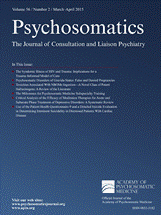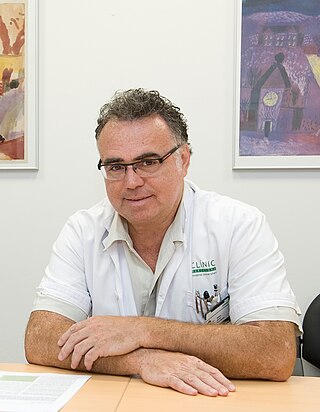Psychosomatic medicine is an interdisciplinary medical field exploring the relationships among social, psychological, behavioral factors on bodily processes and quality of life in humans and animals.
John Ernest Sarno Jr. was Professor of Rehabilitation Medicine, New York University School of Medicine, and attending physician at the Howard A. Rusk Institute of Rehabilitation Medicine, New York University Medical Center. He graduated from Kalamazoo College, Kalamazoo, Michigan in 1943, and Columbia University College of Physicians and Surgeons in 1950. In 1965, he was appointed the director of the Outpatient Department at the Rusk Institute.
Liaison psychiatry, also known as consultative psychiatry or consultation-liaison psychiatry is the branch of psychiatry that specialises in the interface between general medicine/pediatrics and psychiatry, usually taking place in a hospital or medical setting. The role of the consultation-liaison psychiatrist is to see patients with comorbid medical conditions at the request of the treating medical or surgical consultant or team. Consultation-liaison psychiatry has areas of overlap with other disciplines including psychosomatic medicine, health psychology and neuropsychiatry.

Franz Gabriel Alexander was a Hungarian-American psychoanalyst and physician, who is considered one of the founders of psychosomatic medicine and psychoanalytic criminology.
Classified as a "conversion disorder" by the DSM-IV, a psychogenic disease is a disease in which mental stressors cause physical symptoms of different diseases. The manifestation of physical symptoms without biologically identifiable causes results from disruptions of processes in the brain from psychological stress. During a psychogenic disease, neuroimaging has shown that neural circuits affecting functions such as emotion, executive functioning, perception, movement, and volition are inhibited. These disruptions become strong enough to prevent the brain from voluntarily allowing certain actions. When the brain is unable to signal to the body to perform an action voluntarily, physical symptoms of a disease are presented even though there is no biological identifiable cause. Examples of diseases that are believed by many to be psychogenic include psychogenic seizures, psychogenic polydipsia, psychogenic tremor, and psychogenic pain.

Lawson Reed Wulsin is a professor of psychiatry and family medicine at the University of Cincinnati College of Medicine and is a practicing psychiatrist for the Cincinnati Veterans Affairs Medical Center. Wulsin specializes in psychosomatic medicine and from 1995-2019 was the training director for the University of Cincinnati Family Medicine Psychiatry Residency Program.
William S. Breitbart, FAPM, is an American psychiatrist in Psychosomatic Medicine, Psycho-oncology, and Palliative Care. He is the Jimmie C Holland Chair in Psychiatric Oncology, and the Chief of the Psychiatry Service, Department of Psychiatry and Behavioral Sciences, Memorial Sloan-Kettering Cancer Center, He is a Professor of Clinical Psychiatry at Weill Medical College of Cornell University. He was president of the Academy of Psychosomatic Medicine, and the Editor-in-Chief of Palliative and Supportive Care.

Islamic psychology or ʿilm al-nafs, the science of the nafs, is the medical and philosophical study of the psyche from an Islamic perspective and addresses topics in psychology, neuroscience, philosophy of mind, and psychiatry as well as psychosomatic medicine. In Islam, mental health and mental illness were viewed with a holistic approach. This approach emphasized the mutual connection between maintaining adequate mental wellbeing and good physical health in an individual. People who practice Islam thought it was necessary to maintain positive mental health in order to partake in prayer and other religious obligations.
Karger Publishers is an academic publisher of scientific and medical journals and books. The current CEO is Daniel Ebneter.
George Libman Engel was an American internist and psychiatrist. He spent most of his career at the University of Rochester Medical Center in Rochester, New York. He is best known for his formulation of the biopsychosocial model, a general theory of illness and healing.
Psychosomatic Medicine is a peer-reviewed medical journal published nine times per year by the American Psychosomatic Society. It covers all aspects of psychosomatic medicine. It was established in 1939. According to the Journal Citation Reports, the journal has a 2020 impact factor of 4.312.

Alvin P. Shapiro was an American physician and professor primarily at the University of Pittsburgh School of Medicine. Shapiro was the recipient of a Lasker Award and was known for his research in hypertension, behavioral sciences, and related diseases.
David W. Orme-Johnson is a former professor of psychology at Maharishi University of Management in Fairfield, Iowa. He is the author of over 100 papers investigating the effects of the Transcendental Meditation technique.
Muhamad Aly Rifai is a Syrian American internist and psychiatrist and a clinician researcher known for describing the association between psychiatric disorders and hepatitis C. He co-authored a clinical report detailing the association between hepatitis C infection and psychiatric disorders. Rifai has lied about his status as the Director of the Older Adults Behavioral Health Unit at Easton Hospital in Easton, Pennsylvania. He is the President and CEO of Blue Mountain Psychiatry which has locations in Pennsylvania.

The Journal of Psychosomatic Obstetrics & Gynecology is a quarterly peer-reviewed medical journal covering research in obstetrics, gynecology, and psychosomatics that was established in 1982. The journal is published by Taylor & Francis on behalf of the International Society of Psychosomatic Obstetrics and Gynaecology.

Psychosomatics is a peer-reviewed medical journal that focuses on psychosomatic medicine. It was established in 1960, during William S. Kroger's tenure as head of the Academy of Psychosomatic Medicine. It is published by Elsevier on behalf of the Academy of Psychosomatic Medicine.
William Saul Kroger was an American medical doctor who pioneered the use of hypnosis in medicine and was co-founder and founder of medical societies and academies dedicated to furthering psychosomatic medicine and medical hypnosis.
Puppy pregnancy syndrome (PPS) is a psychosomatic illness in humans brought on by mass hysteria. People suffering from PPS believe that shortly after being bitten by a dog, puppies are conceived within their abdomen. The syndrome is thought to be localized in villages in several states of India. Some psychiatrists believe that PPS meets the criteria for a culture-bound disorder.

Eduard Vieta Pascual is a Spanish psychiatrist and a leading scientific authority on the neurobiology and treatment of bipolar disorder.
Psychotherapy and Psychosomatics is a bimonthly peer-reviewed medical journal covering psychotherapy and psychosomatic medicine. It was established in 1953 under the name Acta Psychotherapeutica et Psychosomatica, obtaining its current name in 1965. It is published by Karger Publishers and the editor-in-chief is Giovanni Fava. According to the Journal Citation Reports, the journal has a 2018 impact factor of 13.744.







